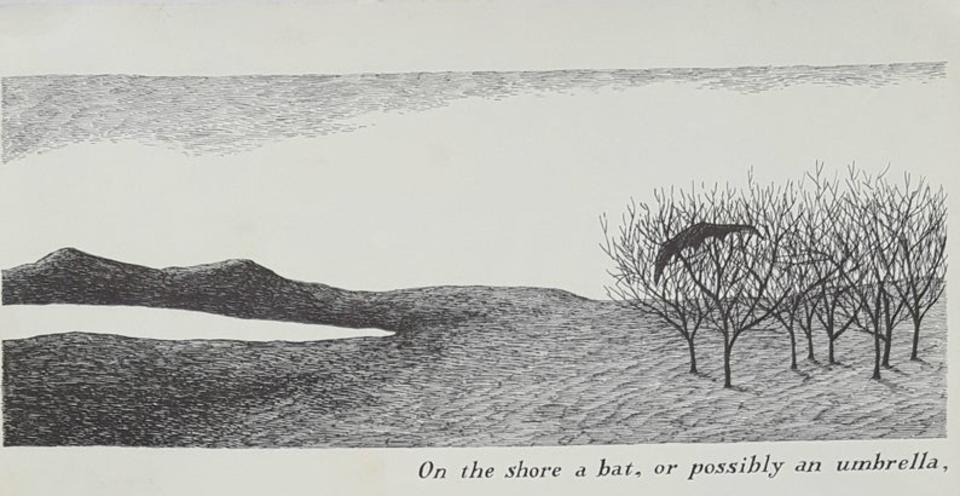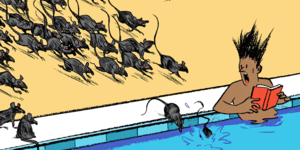
The Dusty Bookshelf, August 2019
What we're reading
August, peak summer. The sky and the cicada drone both whitely weigh down on you from above. The bleached-out leaves of your book are branded onto your eyeballs by the sun. Even when you close your eyes, the glowing pages haunt you...
Ricky Lima:
I have just finished reading a comic series named Planetary by Warren Ellis and John Cassaday. It's about a small team of archeologists looking for all things weird in the world. They investigate monsters on islands, ghosts in Hong Kong, and everything in between. At first, every chapter feels like a separate story where the team encounters one wacky adventure after the other, but by the end it all ties together in a fairly satisfying way. Planetary can get a little too verbose at times, though, where there's lots of telling and not enough showing, but the concepts in this book are so out there that you can't really fault Ellis for having to sit down and walk us through what's going on. We're talking about concepts such as human spirit hard drives, interdimensional travel, and a thing that turns fictional worlds into real worlds. It's not that big of a deal, though, because Cassaday's art is so good you won't mind looking at panels of people talking. He does a great job of making talking heads interesting to look at. Planetary is a fun read if you're looking for a book that is very intricate and explores some super-high-level concepts.
Yasmin Emery:
I'm the kind of person who's always halfway through five different books, but I'll try to narrow it down! I picked up a copy of Jessica Westhead's short story collection Things Not to Do and I'm really loving it; think deadpan, forthright, touching reading. A little contradictory, but that's Westhead's writing. (Also, not to be a shill, but we did publish her 2007 novel, Pulpy & Midge!)
Also underway is Penance by Kanae Minato: a "psychological thriller," as it's blurbed, and a first-person, wholly character-driven one at that. I'm about a third of the way through, and what I like best, I think, is the honest vitriol that each character is allowed to feel and express. I've always been interested in how authors choose to interpret ugly emotions, and Minato allows them free rein in her work.
James Lindsay:
Daniel Borzutzky's Lake Michigan is an unrelenting long-form poem and political drama that takes place on the shores of Chicago, starring the mayor, the police, and the victims of State violence as a tragic chorus. Palpable anger and sadness run through this book that spares metaphor in exchange for vivid images you cannot shake off afterward.
Alana Wilcox:
I just finished On Earth We’re Briefly Gorgeous by Ocean Vuong, which is more than just briefly gorgeous — it’s a totally stunning and deeply moving letter from a young man to his Vietnamese mother, who can’t read. An amazing clash of violence and tenderness, and a portrait of a complicated love. And also Cynan Jones’s Cove (Catapult). The Welsh master of minimalism strikes again with this very quick but long-lasting story of a man in a kayak caught out at sea during a sudden storm. He’s struck by lightning and must try to survive until he can make it back to shore. Understatedly beautiful. I’ve just started The Iliac Crest, by Christina Rivera Garza (Feminist Press in NA, And Other Stories in the UK). Garza is the author of The Taiga Syndrome, which I both adored and felt baffled by, and I expect the same here. On a stormy night, two women invade our narrator’s house and begin interrogating their host. It promises to be sly, slightly opaque, and a good deal of fun as it questions the idea of gender.
Romanne Walker:
I've been reading Dracula by Bram Stoker for a few months now. I'm only about twenty pages from the end, but it's been such a delightfully slow burner at times that I've been wanting to drag it out even more, just so that the mist of it hangs around me for as long as possible. It was written in 1897, and the language is gloriously gothic, even weirdly religious, and sometimes I find myself rooting for the count: undead, misunderstood, looking for love?? There's a lot to read into and a panoply of fun characters; it's chilling and perfect, it's Dracula.
I'm also close to finishing Olga Tokarczuk's Drive Your Plow Over the Bones of the Dead. Personally, I couldn't resist a title like that; for me it was love at first sight. After winning the international Man Booker with Flights last year (which I also had a beautiful relationship with), Tokarczuk's English publishers pulled the ultimate power move and had her come back with a deeply humanist murder mystery. The narrator and protagonist is one of my favourite people I've ever met. She's an old lady living in a small forest community on the border between Poland and the Czech Republic. She's solitary, curious, angry, and generous, and I deeply enjoy being in her company. It'll be hard to bring myself to finish this one too; I'm not looking forward to having to let go of her and her world. The edition I'm reading was published in the UK in 2018 by Fitzcarraldo Editions, one of my favourite publishers, based in London, but Drive Your Plow was originally published in Polish in 2009.
Cystal Sikma:
Raising a puppy has taken up a lot of free time in my life lately, so my extra-curricular reading took a bit of a hit. Thankfully, the pup is getting pretty good at chilling in the park, so you'll likely find us reading on a picnic blanket for the rest of the summer! (I wish!) Here are two novels I recently finished:
Commonwealth by Ann Patchett – This was a lovely book about two families who become forever enmeshed and how childhood trauma can be carried forever. It has an interesting metafictional element (there is a book within the book called Commonwealth) that's used more to bring the family together than to overtly comment on the nature of fiction. The opening chapter, at a child's christening party where friends, family, and neighbours all gather to celebrate with an endless supply of oranges and alcohol, remains the most beautiful section in my mind, but the characters' stories that blossom from there are as perfect as the fruit on the book's cover.
Girl Meets Boy by Ali Smith – A sweet little novel featuring the Iphis myth from Metamorphoses, in which a female child is raised as a boy to avoid being killed by their father, and on their wedding night is turned into a man lest their secret be revealed. In Girl Meets Boy, the myth is inspiration for a queer feminist graffiti artist who leaves her mark on a small Scottish town. I loved the relationship between the two sisters, the queer love storyline, the overall warm and fuzzy feelings the book left me with. Afterward, I learned that the book is part of a long-running multi-author series called the Canongate Myth Series. I'll be interested to check out other books from the series – and more from Ali Smith!

